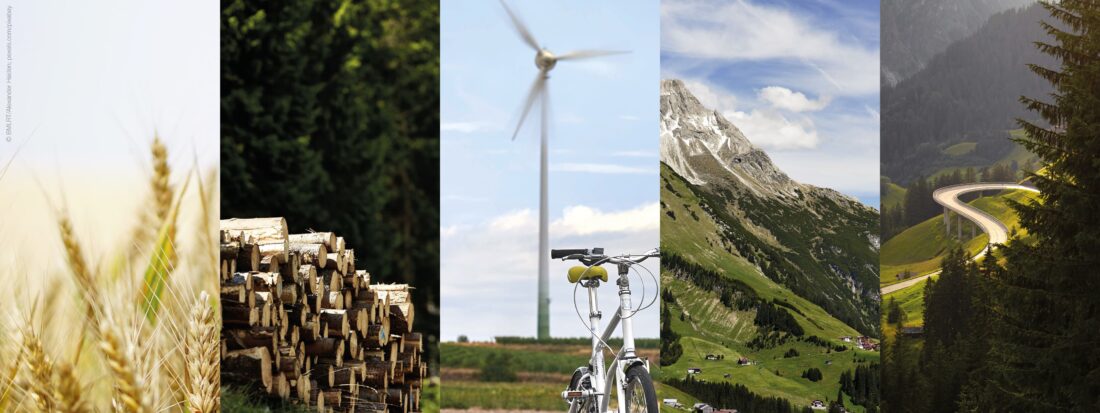Europe is currently facing profound structural challenges. For these courageous decisions and a comprehensive strategy is needed. How this change can be moderated and how Europe’s rural regions can help the Member States and the EU to emerge stronger and more resilient from the current crisis was the topic at the event “Rural areas can do more… Contribution to sustainable solutions” on 14 June 2022 at the House of the European Union in Vienna. The event was organised by the Ecosocial Forum Austria & Europe in collaboration with the Ecosocial Forum Poland and the Representation of the European Parliament in Austria.
In his presentation, Martin Fritsch, Subject Matter Expert at dss+ in Zurich, argued for an integrated view on resilience. He distinguished four different dimensions of resilience for rural societies and economies:
– community or social resilience
– resilience in natural resource management
– economic resilience
– financial resilience
Fritsch asked how Europe’s rural regions can cooperate to strengthen strategic autonomy. According to his three theses, this requires a discourse to reach a common understanding of the needs regarding resilience. Secondly, we have to connect resilience with knowledge building/transfer/exchange for becoming a network of learning societies and economies. And thirdly, governance structures must be adapted to better connect (horizontally and vertically) activity fields, collaborative joint tasks and responsibilities for climate change adaptation. Frisch emphasised the need not only to expand subsidies, but rather the importance of a resource-efficient approach based on market economy principles.
Andrzej Wałęga, head of the Department of Urban Water Management at the Agricultural University of Krakow, discussed the effects of climate change on rural areas in Europe. He used precipitation data to illustrate the changes that rural areas are facing and will continue to face. According to the hydrologist, climate change is a fact. However, he warned against hasty and one-dimensional conclusions about the related changes. Climate change is not the only, and sometimes not even the dominant, factor determining changes in water resources. We need an approach that takes all factors into account, because water retention and sound spatial management will play an increasingly important role in dealing with the impacts of climate change in rural areas in the future.
The discussion then focused on the question “How can Europe’s rural regions help Member States and the EU to emerge stronger and more resilient from the current crisis?”. Dacian Cioloș, member of the Committee on Agriculture and Rural Development in the European Parliament, dealt with the function of food production. He expressed the notion that it is not only a question of the quantity and quality of food, but increasingly a question of affordability of the products. This is currently a problem for many people and must not be ignored in the debate. He also addressed the conflicting goals of the Green Deal, which could endanger Europe’s resilience.
Lukas Mandl, Vice-Chairman of the Subcommittee on Security and Defence in the European Parliament addressed the increasingly different values between urban and rural regions. This has been reflected not least in the Covid vaccination statistics. Here it would be important that the discourses do not become disconnected from another but are conducted jointly in urban and rural areas.
Andreas Jirkowsky, Head of the Department of Commodity Trading at Raiffeisen Ware Austria, emphasised above all the task of building the necessary infrastructure in rural regions – especially in Eastern European countries – in order to be able to make optimal use of the opportunities in rural areas. For this and to secure the European peace project, more solidarity is needed. Restrictions on agricultural exports, such as those imposed by Hungary cause the opposite.
Marianne Penker, Professor of Rural Sociology and Rural Development at the University of Natural Resources and Applied Life Sciences noted that diversity is an important factor of resilience. Studies show that diverse societies are more resilient than less diverse ones. In rural areas in Europe, a lack of gender diversity is particularly evident. Rural regions should become more attractive, especially for women, in order to prevent migration. A new narrative is also needed to promote the basic consensus of society.
In response to populism and the preconditions for a democratic discourse, all discussants spoke in favour of a European cloud solution, which is urgently needed. One-dimensional dependencies – whether IT, energy, pharmaceutical products or food – make Europe vulnerable to blackmail and must be actively combatted.
Wilhelm Molterer, board member of the Ecosocial Forum concluded by summarising the five most important insights from the debate. It is not about equality, but about equal opportunities for urban and rural regions in Europe.
1. In order to keep rural regions functioning, investing in infrastructure is needed. This concerns not only technical improvements, but also, for example, the construction of nursery schools.
2. Resilience must be understood in four dimensions: social, ecological, economic and financial resilience, and must not be interpreted one-dimensionally.
3. A coherent and comprehensive approach is needed across all EU and national programmes, ranging from the Common Agricultural Policy to coherence policy and climate change adaptation.
4. In the future, the discussion on value chains must not only focus on quality and quantity, but also on affordability.
5. Instead of strategic autonomy, we should speak of strategic responsibility. Cooperation and collaboration of all partners – inside and outside the European Union is needed.
Watch the video synopsis of the event (35 minutes)
PROGRAMM
17:00 Welcome, Jacek Pijanowski, President, Ecosocial Forum Poland, Krakow & Hans Mayrhofer, General Secretary, Ecosocial Forum Austria & Europe, Vienna, Huberta Heinzel, European Parliament Liaison Office in Austria, Leszek Książek, Dean, Faculty of Environmental Engineering and Land Surveying of the University of Agriculture in Krakow
17:10 Opening, Wilhelm Molterer, Member of the Board, Ecosocial Forum Austria & Europe, Vienna
17:20 Rural Regions Contributing to Strategic Autonomy and European Resilience (video message), Elisa Ferreira, Commissioner for Cohesion and Reforms, European Commission, Brussels
17:35 How can European rural areas collaborate to strengthen strategic autonomy?, Martin Fritsch, Subject Matter Expert, dss+, Zurich (Download presentation)
17:50 Impacts of Climate Change for European rural areas as production sites, as retention areas …, Andrzej Wałęga, Chair of Sanitary Engineering and Water Economies, Faculty of Environmental Engineering and Land Surveying at the University of Agriculture in Krakow
18:05 Discussion: How can European rural regions help member states and the EU to emerge stronger and more resilient from the current crises?
Dacian Cioloș , MEP, Member – Committee on Agriculture and Rural Development, Brussel
Lukas Mandl, MEP, Vice-Chair – Subcommittee on Security and Defence, Brussels
Andreas Jirkowsky, Head of Division Commodity trading, RWA – Raiffeisen Ware Austria Aktiengesellschaft, Korneuburg
Marianne Penker, Professor for Rural Sociology and Rural Development, Deputy Head, Institute for Sustainable Economic Development University of Natural Resources and Life Sciences, Vienna
18:50 Synopsis & Closing remarks, Wilhelm Molterer
19:00 end
Watch the complete Recording
https://www.facebook.com/oekosozialesforum/videos/1707256232966481/

